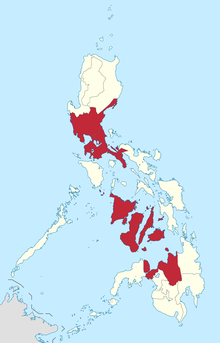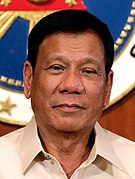| 2019 Philippines measles outbreak | |
|---|---|
 Regions officially experiencing a measles outbreak in red. Regions officially experiencing a measles outbreak in red. | |
| Disease | Measles |
| Index case | Indeterminate, Outbreak first declared in Metro Manila |
| Confirmed cases | 31,056 (April 13) |
| Deaths | 415 (April 13) |
The 2019 Philippines measles outbreak began in early 2019. An outbreak of measles was officially declared in February 2019 in select administrative regions in Luzon and Visayas including Metro Manila by the Philippine government. The outbreak is attributed to lower vaccination rates, from a high of 88% 10 to 15 years previous to 74% at the time of the outbreak, allegedly caused by the Dengvaxia controversy.
Epidemiology
The Department of Health (DOH) of the Philippines declared a measles outbreak in Metro Manila due to a 550% increase in the number of patients from January 1 to February 6, 2019, compared to figures of the equivalent period from 2018. Outbreaks were also officially declared in Central Luzon, Calabarzon, Western Visayas, Central Visayas. and Northern Mindanao. A joint report by the United Nations Children's Fund (UNICEF) and World Health Organization has stated in the report that the outbreak started much earlier in late-2017 in Mindanao.
Metro Manila and Calabarzon being the most affected regions with at least a thousand cases each.
The DOH has recorded at 8,443 cases from January 1 to February 18, 2019, with 135 of these cases resulting to deaths. On March 1, 2019, it was reported that there are at least 13,723 cases and 215 deaths recorded nationwide.
By April 30, the DOH declared that the measles outbreak is already under control but remained hesitant in officially lifting the outbreak declaration. There are 31,056 cases and 415 deaths recorded from January 1 to April 13.
Cases
In connection with the measles outbreak, the Philippine government has been maintaining a tally of confirmed cases and deaths from measles nationwide, including in regions not officially experiencing a measles outbreak.
| Region | Confirmed cases |
Confirmed deaths |
Official outbreak declaration |
|---|---|---|---|
| Ilocos Region (Region I) | 1,035 | 12 | No outbreak |
| Cagayan Valley (Region II) | 349 | 2 | No outbreak |
| Central Luzon (Region III) | 3,761 | 57 | Outbreak declared |
| Calabarzon | 4,838 | 98 | Outbreak declared |
| Mimaropa | 987 | 8 | No outbreak |
| Bicol Region (Region V) | 694 | 6 | No outbreak |
| Western Visayas (Region VI) | 1,371 | 5 | Outbreak declared |
| Central Visayas (Region VII) | 1,115 | 10 | Outbreak declared |
| Eastern Visayas (Region VIII) | 1,023 | 24 | No outbreak |
| Zamboanga Peninsula (Region IX) | 302 | 1 | No outbreak |
| Northern Mindanao (Region X) | 1,159 | 10 | Outbreak declared |
| Davao Region (Region XI) | 489 | 7 | No outbreak |
| Socsksargen (Region XII) | 576 | 4 | No outbreak |
| Caraga (Region XIII) | 576 | 2 | No outbreak |
| Bangsamoro (BARMM) | 451 | 4 | No outbreak |
| Cordillera Administrative Region (CAR) | 367 | 1 | No outbreak |
| Metro Manila (National Capital Region; NCR) | 4,568 | 87 | Outbreak declared |
| Total (Nationwide) | 23,563 | 338 | Outbreak in 6 out 17 regions |
Cause
Vaccination against measles is available for free in government hospitals and health centers but there is a lowered trust in vaccination in the country. According to an opinion poll conducted by the London School of Hygiene and Tropical Medicine in 2018, 32 percent of the surveyed 1,500 Filipinos trusted vaccines. In the 2015 iteration of the poll, 93 percent of the respondents said they trusted vaccines. Health Secretary Francisco Duque III attributes the lowered trust on the government's immunization drive due to the Dengvaxia controversy.
The United Nations International Children's Emergency Fund (UNICEF) said that the outbreak is caused by "failure of the health system" saying that the distribution of vaccines down to the barangay level has not worked properly. They cited that immunization rates in the country have been declining in the past 10 to 15 years with about 74% immunized at the time of the outbreak compared to a high of 88%; 10 or 15 years ago. UNICEF and the WHO has also attributed increase vaccine hesitancy in 2018 due to the Dengue vaccine controversy as a factor contributing to the outbreak. Statistical data from UNICEF, however, shows that decline in Measles vaccination began as early as 2014, four years before the Dengvaxia controversy happened.
As of March 1, 2019, 62 percent of all cases recorded at that time involved individuals who were not vaccinated against measles.
Response
The Department of Health released an informercial featuring boxer Manny Pacquiao in order encourage parents and guardians to get their children vaccinated against measles in response to the outbreak.
Neighbouring Malaysia's state of Sabah through the Health and People Wellbeing Ministry working towards getting all children, especially stateless people to be vaccinated following the outbreak in their neighbour the Philippines.
See also
- 2019 Samoa measles outbreak
- 2019 Tonga measles outbreak
- 2019 New Zealand measles outbreak
- Measles resurgence in the United States
- Vaccination
- Vaccine hesitancy
Notes
- ^ Nationwide statistics by the Department of Health – Health Emergency Management Bureau. Includes figures from regions where an outbreak has not been officially declared.
References
- ^ Aguilar, Krissy (7 February 2019). "Failure of health system leads to measles outbreak – UNICEF". Philippine Daily Inquirer. Retrieved 9 February 2019.
- "DOH Expands Measles Outbreak Declarations to Other Regions". Department of Health. Archived from the original on 27 April 2021. Retrieved 11 February 2019.
- "Questions and answers on the measles outbreak in the Philippines". World Health Organization. 12 February 2019. Retrieved 20 February 2019.
- ^ "NDRRMC Update Sitrep No. 07 re Measles Outbreak, 01 March 2019, 5:00 PM". reliefweb. National Disaster Risk Reduction and Management Council. 1 March 2019. Retrieved 29 March 2021.
- ^ "Philippines Situation Report 11 Measles Outbreak" (PDF). UNICEF, World Health Organization. Retrieved 1 June 2019.
- Cruz, Sofia Toma (11 February 2019). "At least 70 deaths due to measles – DOH". Rappler. Retrieved 11 February 2019.
- "Number of measles cases climbs to more than 4,300 — DOH". CNN Philippines. 11 February 2019. Archived from the original on 26 January 2021. Retrieved 11 February 2019.
- "Measles cases breach 8,000 mark but may dwindle in April – DOH". CNN Philippines. 19 February 2019. Archived from the original on 19 May 2019. Retrieved 20 February 2019.
- "Measles outbreak 'almost over': DOH". Philippine News Agency. 30 April 2020. Retrieved 6 June 2020.
- ^ "NDRRMC Update Sitrep No. 13 re Measles Outbreak, 26 March 2019, 5:00 PM" (PDF). National Disaster Risk Reduction and Management Council. National Disaster Risk Reduction and Management Council. 26 March 2019. Retrieved 3 April 2019.
- "Measles outbreak declared in 3 more regions". ABS-CBN News. 7 February 2019. Retrieved 9 February 2019.
- Philippines: WHO and UNICEF estimates of immunization coverage: 2018 revision data.unicef.org accessed 15 May 2020
- Crisostomo, Sheila (19 February 2019). "Measles outbreak death toll hits 136". The Philippine Star. Retrieved 20 February 2019.
- Stephanie Lee (14 February 2019). "Sabah moves to control measles after Philippines outbreak". The Star. Retrieved 27 August 2019.
| 2019–2020 measles outbreaks | |
|---|---|
| >10,000 confirmed cases |
|
| 1,000 to 10,000 confirmed cases |
|
| <1,000 confirmed cases |
|
| Related: Measles resurgence in the United States | |
| Pandemics, epidemics and notable disease outbreaks | |||||||||||||||||||||
|---|---|---|---|---|---|---|---|---|---|---|---|---|---|---|---|---|---|---|---|---|---|
| Local |
| ||||||||||||||||||||
| Global |
| ||||||||||||||||||||

